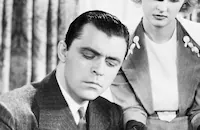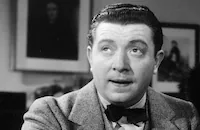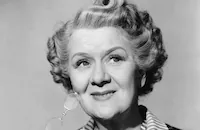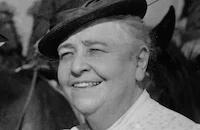Heat Lightning

Brief Synopsis
Cast & Crew
Mervyn Leroy
Aline Macmahon
Ann Dvorak
Preston Foster
Lyle Talbot
Glenda Farrell
Film Details
Technical Specs

Synopsis
Two sisters, Olga and Myra, operate a combination gas station, lunchroom and tourist hotel in the California desert. Olga works as a mechanic and is jaded when it comes to men. Myra, her younger sister, is in love with a man named Steve Laird, whom Olga distrusts, as she believes that Steve will take advantage of Myra sexually. Despite her sister's warnings, Myra makes plans to meet Steve after dark. George and Jeff, two thieves on the run from a bank heist in Salt Lake City in which George killed two cashiers, stop at the station on their way to the Mexican border. Olga recognizes George as Jerry, the man she loved and walked out on when she was a beautiful cabaret dancer in Tulsa. When the sheriff passes through, George pretends to be an oilman and Olga says that he is an old friend. That evening, Mrs. Tifton, called "Feathers," and Mrs. Aston-Ashley, called "Tinkle," rich, divorced women who are laden with jewels, arrive with their chauffeur Frank on their way home from Reno. Hoping to steal the jewels, George and Jeff plan to spend the night. When Olga asks him to leave, George tells Olga he no longer wants her because she has let herself go. As heat lightning flashes in the distance, Olga transforms herself into a beautiful woman and says goodbye to George, who kisses her. While Olga is distracted, Myra sneaks out with Steve. The divorcées, meanwhile, have locked their jewels in Olga's safe to protect them from a friendly Mexican family who they fear are gypsies. At dawn, Steve brings Myra home after having taken advantage of her. Myra then sees George leaving Olga's room and confesses to Olga that she was right about Steve, and the sisters hold each other. Olga then catches George and Jeff picking her safe and overhears George tell Jeff he slept with Olga so that Jeff could perform the robbery. Olga then shoots George, who is armed, and he apologizes as he dies in her arms. Olga lets Jeff get away, then explains the incident to her friend, Everett Marshall, who promises to take care of everything. Olga then returns to her emotionless life as a mechanic.

Director

Mervyn Leroy
Cast

Aline Macmahon

Ann Dvorak

Preston Foster

Lyle Talbot

Glenda Farrell

Frank Mchugh

Ruth Donnelly
Theodore Newton
Willard Robertson
Harry C. Bradley
James Durkin

Jane Darwell

Edgar Kennedy
Muriel Evans
Crew

Film Details
Technical Specs

Articles
Heat Lightning
While The Petrified Forest, though equally stagebound, is the more accomplished film, Heat Lightning remains a fascinating Pre-Code oddity with a proto-feminist heroine, risqué dialogue and scenes ripe with sexual innuendo. MacMahon plays Olga, a woman with a past who has started a new life for herself in a remote prairie outpost away from the corrupting influences of the city. Determined to prevent her younger sister Myra (Ann Dvorak) from making the same mistakes she did with men, Olga only further alienates Myra by refusing to let her date. The dynamic in their relationship changes, however, with the arrival of fleeing criminals George (Preston Foster) and Jeff (Lyle Talbot), who pass themselves off as oilmen on a business trip. George is actually Olga's former lover Jerry who is now using a pseudonym for his life of crime. It was Olga's tumultuous relationship with this wanted killer that made her swear off men or harbor any illusions about love and marriage. Yet, despite her refusal to give into old feelings, Olga feels the stirring of a deep seated desire which is expressed through her slow transformation from a bandana-adorned mechanic in dirty overalls to her appearance in a dress wearing her hair down. The change in Olga is not lost on Jerry, who decides to manipulate it to his advantage, or Myra, who quickly grasps the connection between her sister and "George" and retaliates by sneaking off with the town wastrel. It all builds to a violent climax which is both inevitable and strangely satisfying.
Directed by Mervyn LeRoy, Heat Lightning veers unevenly between drama and comedy for the duration of its running time but does provide several scene-stealing moments for its supporting cast, all of them familiar faces from the Warner Bros. stock company; Glenda Farrell and Ruth Donnelly as recent divorcees and traveling companions trade tart quips and insults with each other constantly while vying for the attentions of their chauffeur (Frank McHugh); two showgirls and their sugar daddy drop by briefly on their way to Hollywood and, at the start of the movie, Edgar Kennedy as a hen-pecked husband and Jane Darwell as his nagging wife stop for car repairs and provide a good argument against matrimony. In addition, a Mexican family arrives and camps out on the premises, providing a background musical accompaniment to the personal dramas of the motor court guests.
According to notes by the American Film Institute, the Legion of Decency added Heat Lightning to their list of banned films at the time. The same source also stated that "...the Hays Office objected to the seductions that occur in the film because they were in violation of the Production Code, particularly the scene in which "George" leaves "Olga's" room in the morning and buttons his coat." The Office also objected to a line of dialogue delivered by one of the showgirls to her gold-digging companion, "Say, it's your turn to sit up front with that old thigh-pincher." Though Heat Lightning is relatively tame compared to more racy Pre-Code titles like Baby Face (1933) and Safe in Hell (1931), it is still appropriately cynical, tough-minded and suggestive when it needs to be; it would later be remade as Highway West in 1941 starring Brenda Marshall and Arthur Kennedy.
Typical of the critical reaction to Heat Lightning is this excerpt from the New York Times reviewer Mordaunt Hall who called it "a drab melodrama with occasional flashes of forced comedy" and went on to write that the movie "does not offer Miss MacMahon the opportunity she deserves, for although she gives a believable performance the role is not well suited to her. Aside from Olga, the part played by Miss MacMahon, the other characters seldom ring true." Fans of Ms. MacMahon and Pre-Code cinema, however, will probably overlook the obvious flaws and theatrical staging of Heat Lightning and enjoy many aspects of the movie that were not apparent to most critics of its era.
Producer: Samuel Bischoff (uncredited)
Director: Mervyn LeRoy
Screenplay: Brown Holmes, Warren Duff (screenplay); Leon Abrams, George Abbott (play)
Cinematography: Sid Hickox
Art Direction: Jack Okey
Film Editing: Howard Bretherton
Cast: Aline MacMahon (Olga), Ann Dvorak (Myra), Preston Foster (George), Lyle Talbot (Jeff), Glenda Farrell (Mrs. 'Feathers' Tifton), Frank McHugh (Frank the Chauffeur), Ruth Donnelly (Mrs. 'Tinkle' Ashton-Ashley), Theodore Newton (Steve Laird, Myra's Boyfriend), Willard Robertson (Everett Marshall), Harry C. Bradley ('Popsy', a Businessman).
BW-64m.
by Jeff Stafford

Heat Lightning
Quotes
Trivia
The play opened in New York City, New York, USA on 15 September 1933 and ran for 44 performances. In the cast were Eddie Acuff, Jean Dixon, Joe Downing and Robert Gleckler.
Notes
The character "George" is addressed as such by his partner, "Jeff," but "Olga" calls him "Jerry" throughout the film. Although the plot does not clarify this point, "George" was probably an alias that "Jerry" used. A news item in Daily Variety on November 17, 1933 notes that the film crew was on location in Vacaville, CA for two-and-a-half weeks. This film was on the Legion of Decency's first list of banned films, which was published in Motion Picture Daily on May 14, 1934. According to files in the MPAA/PCA Collection at the AMPAS Library, the Hays Office objected to the seductions that occur in the film because they were in violation of the Production Code, particularly the scene in which "George" leaves "Olga's" room in the morning and buttons his coat. The Office also objected to the underlined portion of the divorcée's line (in reference to the chauffeur): "Say, it's your turn to sit up in front with that old thigh-pincher." The film was remade by First National in 1941 as Highway West, starring Brenda Marshall and Arthur Kennedy and directed by William McGann.















